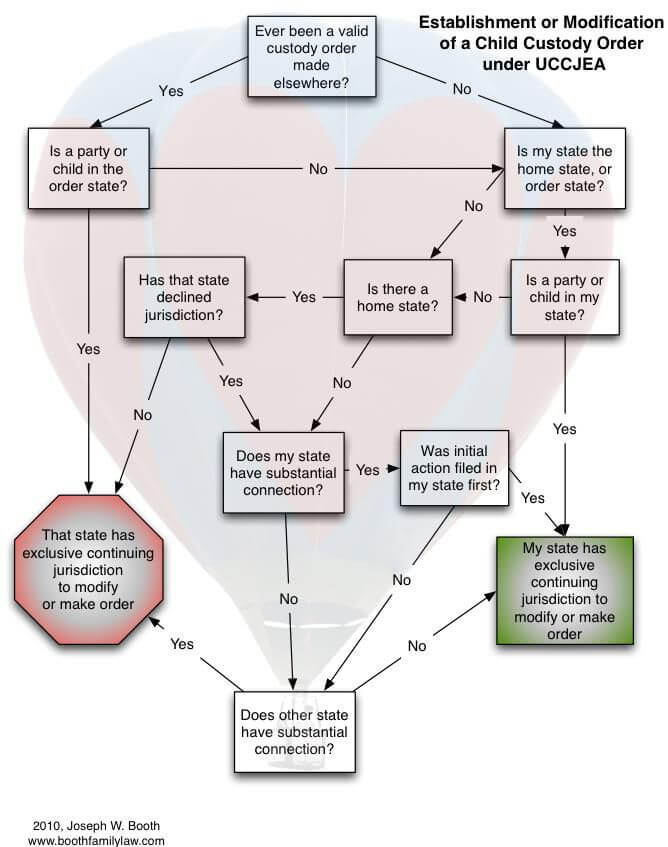Tennessee UCCJEA: Overview and Introduction
What does Uniform Child Custody Jurisdiction mean? Jurisdiction disputes between parents located in different states happen more often that you might think. The UCCJEA is the applicable law for resolving these disputes. It is complicated, detailed, and difficult to interpret. This writing seeks to provide an introduction and overview. For an experienced family lawyer to provide a legal opinion on any particular custody jurisdiction dispute requires a detailed review of the specific states’ statutes and associated appellate case law.

Child Custody Jurisdiction in the Tennessee UCCJEA
When will the Tennessee court exercise custody jurisdiction with separated parents residing in different states? Should it matter if the child lives with grandparents in a third state? Resolving interstate jurisdictional conflicts is not always clear cut.
What does Uniform Child Custody Jurisdiction mean?
Consider a situation wherein the mother lives in Tennessee while the father resides in Florida. He has had the child with him for the past six months, initially agreeing to return the child to the mother for the Fall school start. He has a change of heart, however, and petitions the Florida court for sole custody. The mother’s attorney files her petition for joint custody in Tennessee.
Without getting into the merits of either parent’s case, which state court should hear and decide the custody issue? The answer lies in the Uniform Child Custody Jurisdiction and Enforcement Act.
How Many States Have Adopted the UCCJEA?
The UCCJEA has been the law in Tennessee since 1999, as amended, and has been adopted in D.C. and every other state but Massachusetts. The UCCJEA applies when two or more states have some legal basis to assert custody jurisdiction. See T.C.A. § 36-6-201, et seq.
What Is the Purpose of the UCCJEA?
The law’s purpose is to engender interstate jurisdictional consistency regarding all matters involving child custody. Parents as well as third parties (grandparents, foster parents, stepparents and adults in loco parentis) may feel the impact of the UCCJEA. With the exclusion of proceedings for adoption or emergency medical care (T.C.A. § 36-6-206), the statute covers everything from initial custody determinations to parenting plan modifications to visitation requests.
UCCJEA Protects Children from Harmful Tactics
There was a time when some parents, by relocating with the child to a new state, avoided enforcement of custody orders from the jurisdiction left behind. Other parents crossed state lines to file in jurisdictions with more favorable divorce and custody laws. These tactics – some lawful, some unlawful – had harmful consequences for children.
The UCCJEA promotes cooperation between courts in sister states so that parties, lawyers, and judges can determine with greater certainty which court should assert custody jurisdiction. The statute sets forth the process for deciding which state court is best positioned to determine what is in the child’s best interests and to enter orders accordingly. Key statutory objectives are:
- Deterring child abductions and interstate parental kidnapping (see also the Parental Kidnapping and Protection Act);
- Preventing forum shopping for more favorable venues in other states or nations;
- Avoiding the re-litigation of custody decisions;
- Promoting consistent jurisdiction and enforcement provisions in interstate child custody and visitation cases; and
- Facilitating enforcement in Tennessee of custody decrees entered in other states.
The statute tells us when a case filed in another state’s court should be transferred to Tennessee. And when a case filed here should be transferred to another state. Sounds simple, but it’s not. The statute’s complexities continue to make interpretation and application difficult for family lawyers and judges.
Who gets custody if parents live in different states?

Who gets custody if parents live in different states?
Priority Custody Jurisdiction
Whether the case involves an initial custody determination or modification of a Tennessee decree, there is no shortcut. T.C.A. § 36-6-216 mandates a multi-step analysis, providing five potential jurisdictional hooks – home state, significant connections, deferral, default, and temporary emergency jurisdiction. Here is an overview of the process in order of priority.
- Home State Analysis
Is Tennessee the child’s home state? The concept of home state is the lynchpin of UCCJEA jurisdiction. The child’s home state is defined as “the state in which a child lived with a parent or a person acting as a parent for at least six (6) consecutive months immediately before the commencement of a child custody proceeding. In the case of a child less than six (6) months of age, ‘home state’ means the state in which the child lived from birth with any of the persons mentioned. A period of temporary absence of any of the mentioned persons is part of the period” and counts toward the six months. T.C.A. § 36-6-205(7). If the answer is “No,” then continue the inquiry.
Does Tennessee have home state jurisdiction? Tennessee has home state jurisdiction if it was the child’s home state within the six months before the proceeding commenced, the child is absent, and a parent or someone acting as a parent continues to live in Tennessee. If “No,” then continue to step 2.
- Significant Connections Analysis
Does Tennessee have significant connections? When no sister state is the child’s home state or, alternatively, the home state’s court declines to exercise jurisdiction because Tennessee is the better forum given the circumstances, then Tennessee may assert jurisdiction. But only if it has significant connections to the child. This means the child and one or both parents, or someone acting as a parent, have significant connections to Tennessee (more than physical presence) where substantial evidence is available concerning the child’s care, protection, training, and personal relationships. If “No,” then continue.
- Deferral Analysis
It’s possible that all courts having jurisdiction under 1 or 2 above will defer to Tennessee and decline to exercise jurisdiction because this is the more appropriate forum to determine custody. If no deferral, then continue the inquiry.
- Default Analysis
When no other court has jurisdiction under 1,2, or 3 above, Tennessee can assume jurisdiction to make the child custody determination.
Emergency Jurisdiction Analysis
Another jurisdictional hook is the Tennessee court’s temporary emergency jurisdiction under T.C.A. § 36-6-219. The child must be physically present in Tennessee. Emergency grounds for jurisdiction are abandonment or the need to protect the child, a sibling, or a parent from immediate mistreatment or abuse. An emergency order may become permanent if this becomes the child’s home state.
Jurisdictional Conflicts Between States
The discussion thus far has focused on the step-by-step inquiry, but seldom are interstate cases so neat and tidy. Convoluted jurisdictional conflicts between states are not a rarity – for instance:
- What if Tennessee has home state jurisdiction, but another state court makes an initial custody determination?
With the child’s home state as Tennessee which has not declined jurisdiction, another state court’s initial custody decree is not entitled to full faith and credit. Not in Tennessee and not in other states. A costly paper tiger, the defective decree is unenforceable.
- What if the Tennessee court entered the initial custody decree, but the child’s home state is now elsewhere?
Another key concept is the court’s exclusive continuing jurisdiction over its initial custody decree, something central to enforcement and modification proceedings. There are two reasons why the Tennessee court would relinquish its exclusive continuing jurisdiction over the custody matter. One, no significant connections remain between Tennessee and the child or, alternatively, between the child and a parent or person acting as a parent. And substantial evidence of the child’s care, protection, training, and personal relationships is no longer available here. Two, no one still lives in Tennessee – not the child, not the parents, and not anyone acting as a parent. T.C.A. § 36-6-217(a).
What if Tennessee is asked to modify another state court’s initial custody decree? What happens to another state’s custody enforcement proceeding when a petition for modified custody is filed here? This is the tip of the “what if” iceberg!
Joe Booth’s Chart
Below is a copy of a UCCJEA flow chart created by Kansas attorney Joe Booth from his web site. Reprinted here with permission.

Joseph W. Booth’s UCCJEA flow chart
When Two Competing Petitions Exist in Two Different States
As a matter of practical application, many custody jurisdiction disputes involving two states, there will be two judges and four sets of lawyers. Logistics get tough, certainly. At some point, in most cases, the resolution may come as a result of the two states’ judges speaking on the phone about the facts and direction of the litigation. If one judge of the judges is more direct and asks for the jurisdiction to be ceded, that pulls a lot of weight towards the final decision between the two judges. Then, if the losing parent decides to appeal, that is what results in our case law for direction in future matters. Given the vast possibilities of differing factual situations, finding cases which are directly on point to a current client’s matter can be very challenging.
One last thought. Having attended many ABA Family Law Section conferences discussing the UCCJEA and having tried jurisdiction disputes before several different judges, to the lawyer handling this type of case the author says, “Good Luck!” Not only is the framework confusing, but there are opportunities for lawyers and judges alike to misinterpret the law’s provisions. Any experienced family lawyer can lose a UCCJEA dispute he or she should win. Any experienced family lawyer can win a UCCJEA he or she should lose. Needless to say, this adds considerably to parents’ anxieties about their children’s futures and their own.
Special gratitude.
Thank you, Joe for your friendship. Your UCCJEA flow chart is awesome!










